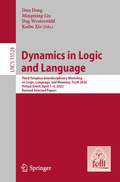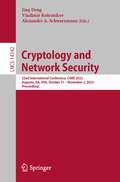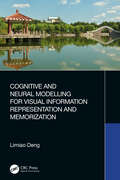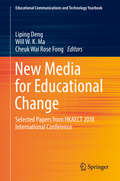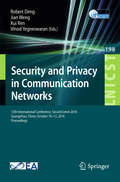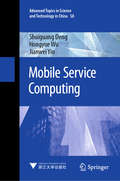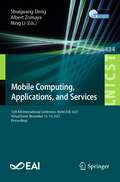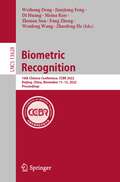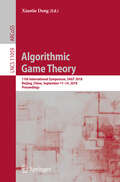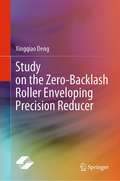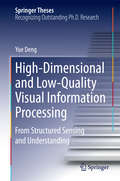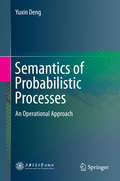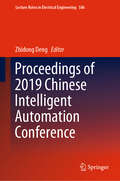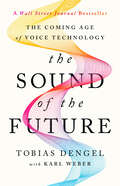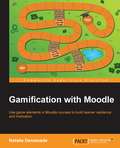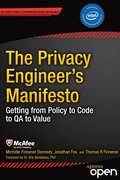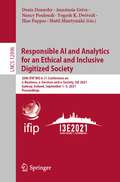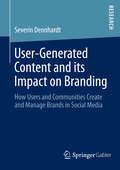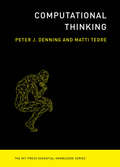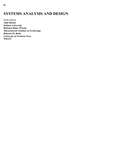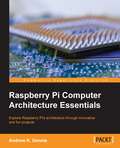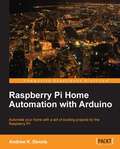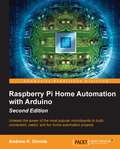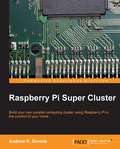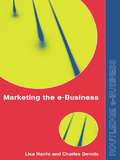- Table View
- List View
Dynamics in Logic and Language: Third Tsinghua Interdisciplinary Workshop on Logic, Language, and Meaning, TLLM 2022, Virtual Event, April 1–4, 2022, Revised Selected Papers (Lecture Notes in Computer Science #13524)
by Dun Deng Mingming Liu Dag Westerståhl Kaibo XieEdited in collaboration with FoLLI, the Association of Logic, Language and Information, this book constitutes the refereed proceedings of the Third Tsinghua Interdisciplinary Workshop on Logic, Language, and Meaning, TLLM 2022, which was held virtually in April 2022.The 9 full papers presented in this volume were carefully reviewed and selected from 13 submissions. The workshop covers a wide range of topics such as dynamic semantics, logical dynamics, Dynamic Epistemic Logic, Discourse Representation Theory, formal semantics, free choice inference, update semantics, and donkey sentences.
Cryptology and Network Security: 22nd International Conference, CANS 2023, Augusta, GA, USA, October 31 – November 2, 2023, Proceedings (Lecture Notes in Computer Science #14342)
by Jing Deng Vladimir Kolesnikov Alexander SchwarzmannThis book constitutes the refereed proceedings of the 22nd International Conference on Cryptology and Network Security, CANS 2023, which was held in October/November 2023 in Augusta, GA, USA.The 25 papers presented were thoroughly revised and selected from the 54 submissions. They are organized in the following topical sections: Schemes I; Basic Primitives; Security; MPC with Cards; Blockchain; MPC and Secret Sharing; Schemes II.
Cognitive and Neural Modelling for Visual Information Representation and Memorization
by Limiao DengFocusing on how visual information is represented, stored and extracted in the human brain, this book uses cognitive neural modeling in order to show how visual information is represented and memorized in the brain. Breaking through traditional visual information processing methods, the author combines our understanding of perception and memory from the human brain with computer vision technology, and provides a new approach for image recognition and classification. While biological visual cognition models and human brain memory models are established, applications such as pest recognition and carrot detection are also involved in this book. Given the range of topics covered, this book is a valuable resource for students, researchers and practitioners interested in the rapidly evolving field of neurocomputing, computer vision and machine learning.
New Media for Educational Change: Selected Papers from HKAECT 2018 International Conference (Educational Communications and Technology Yearbook)
by Liping Deng Will W. Ma Cheuk Wai FongThis book gathers selected papers presented at the Hong Kong Association for Educational Communications and Technology 2018 International Conference on the theme of “new media for educational change: effects on learning and reflection on practice”. It contributes to a scholarly discussion that goes beyond what new media can contribute to education, and reflects on best practices as well as lessons learned by applying new media in a wide range of fields. Scholars from educational technology, journalism, higher education, etc. share their findings in a number of formats, such as empirical research, case studies of best practices, literature reviews, etc. The topics addressed include but are not limited to media practice, application of innovative technologies, MOOCs in higher education, social media for learning, gamification, learning analytics, and comparative studies.
Security and Privacy in Communication Networks
by Robert Deng Jian Weng Kui Ren Vinod YegneswaranThisvolume constitutes the thoroughly refereed post-conference proceedings of the11th International Conference on Security and Privacy in CommunicationNetworks, SecureComm 2015, held in Dallas, TX, USA, in October 2015. The 29 regular and 10 poster papers presented were carefullyreviewed and selected from 107 submissions. It also presents 9 papers acceptedof the workshop on Applications and Techniques in Cyber Security, ATCS 2015. The papers are grouped in the following topics: mobile, system,and software security; cloud security; privacy and side channels; Web andnetwork security; crypto, protocol, and model.
Mobile Service Computing (Advanced Topics in Science and Technology in China #58)
by Shuiguang Deng Hongyue Wu Jianwei YinThis book introduces readers to the background and principles of mobile service computing. It discusses various aspects of service computing in mobile environments, including key methods and techniques for service selection, recommendation, composition, offloading, execution, deployment, and provision.
Mobile Computing, Applications, and Services: 12th EAI International Conference, MobiCASE 2021, Virtual Event, November 13–14, 2021, Proceedings (Lecture Notes of the Institute for Computer Sciences, Social Informatics and Telecommunications Engineering #434)
by Shuiguang Deng Albert Zomaya Ning LiThis book constitutes the thoroughly refereed post-conference proceedings of the 12th International Conference on Mobile Computing, Applications, and Services, MobiCASE 2021, held in November 2021. Due to COVID-19 pandemic the conference was held virtually. The 9 full papers were carefully reviewed and selected from 21 submissions. The papers are organized in two topical tracks: mobile application and deep learning, and mobile application with data analysis.
Biometric Recognition: 16th Chinese Conference, CCBR 2022, Beijing, China, November 11–13, 2022, Proceedings (Lecture Notes in Computer Science #13628)
by Weihong Deng Jianjiang Feng Di Huang Meina Kan Zhenan Sun Fang Zheng Wenfeng Wang Zhaofeng HeThis book constitutes the proceedings of the 16th Chinese Conference on Biometric Recognition, CCBR 2022, which took place in Beijing, China, in November 2022.The 70 papers presented in this volume were carefully reviewed and selected from 115 submissions. The papers cover a wide range of topics such as Fingerprint, Palmprint and Vein Recognition; Face Detection, Recognition and Tracking; Gesture and Action Recognition; Affective Computing and Human-Computer Interface; Speaker and Speech Recognition; Gait, Iris and Other Biometrics; Multi-modal Biometric Recognition and Fusion; Quality Evaluation and Enhancement of Biometric Signals; Animal Biometrics; Trustworthy, Privacy and Personal Data Security; Medical and Other Applications.
Algorithmic Game Theory: 11th International Symposium, SAGT 2018, Beijing, China, September 11-14, 2018, Proceedings (Lecture Notes in Computer Science #11059)
by Xiaotie DengThis book constitutes the refereed proceedings of the 11th International Symposium on Algorithmic Game Theory, SAGT 2018, held in Beijing, China, in September 2018. The 19 full papers presented together with 6 short papers and 5 plenary talks were carefully reviewed and selected from 54 submissions. The papers cover various important aspects of algorithmic game theory including market equilibrium, auctions and applications, two sided markets, cake-cutting, cooperative games, voting games, multi-agent scheduling, price of stability, various mechanism design problems: online-dynamics and multi-stages as well as revenue maximization and resource allocation and applications.
Study on the Zero-Backlash Roller Enveloping Precision Reducer
by Xingqiao DengThis book aims to describe the basis meshing theory of roller enveloping worm gear and provides the new design and manufacturing method for solving the problem of backlash in gearing transmission. Also, it presents a new efficient numerical calculation means to predict the lubrication properties for two complex surface meshing in space. Our results provide a series of new viewpoints for design precision reducer.
High-Dimensional and Low-Quality Visual Information Processing
by Yue DengThis thesis primarily focuses on how to carry out intelligent sensing and understand the high-dimensional and low-quality visual information. After exploring the inherent structures of the visual data, it proposes a number of computational models covering an extensive range of mathematical topics, including compressive sensing, graph theory, probabilistic learning and information theory. These computational models are also applied to address a number of real-world problems including biometric recognition, stereo signal reconstruction, natural scene parsing, and SAR image processing.
Semantics of Probabilistic Processes
by Yuxin DengThis book discusses the semantic foundations of concurrent systems with nondeterministic and probabilistic behaviour. Particular attention is given to clarifying the relationship between testing and simulation semantics and characterising bisimulations from metric, logical, and algorithmic perspectives. Besides presenting recent research outcomes in probabilistic concurrency theory, the book exemplifies the use of many mathematical techniques to solve problems in computer science, which is intended to be accessible to postgraduate students in Computer Science and Mathematics. It can also be used by researchers and practitioners either for advanced study or for technical reference.
Proceedings of 2019 Chinese Intelligent Automation Conference (Lecture Notes in Electrical Engineering #586)
by Zhidong DengThe proceedings present selected research papers from the CIAC2019, held in Jiangsu, China on September 20-22, 2019. It covers a wide range of topics including intelligent control, robotics, artificial intelligence, pattern recognition, unmanned systems, IoT and machine learning. It includes original research and the latest advances in the field of intelligent automation. Engineers and researchers from academia, industry, and government can gain valuable insights into solutions combining ideas from multiple disciplines in this field.
The Sound of the Future: The Coming Age of Voice Technology
by Tobias DengelA Wall Street Journal Bestseller A USA Today Bestseller Why voice technology is the next big thing in technology, as big as mobile a decade ago and the internet in the late 90s, fundamentally altering the way companies do business. Voice is the next technology – remarkably similar in potential impact to the internet and mobile computing - poised to change the way the world works. Tobias Dengel is in the vanguard of this breakthrough, understanding the deep, wide-ranging implications voice will have for every industry. In The Sound of the Future, he connects the dots about this emerging paradigm to vividly illustrate how business leaders can stay ahead of the game, rather than scrambling to catch up, as voice technology gradually reveals its power, creating a host of new winners and losers. Using fascinating, colorful stories, Dengel explains how the &“voice-first&” experience is becoming part of the global technology mainstream, exploring the ways voice will do a better job of serving basic human needs such as safety, speed, accuracy, convenience, and fun, as well as making it possible for hundreds of millions of people around the planet to participate more fully and productively in today&’s high-tech world by making interactions with technology virtually effortless. A pervasive technology like the internet and mobile, voice, with applications in marketing, sales, service, manufacturing, and logistics, will change the way we work at every level and every function, driving down costs, boosting productivity, and enabling the creation of entirely new business models. This is not simply about Siri and Alexa. They are the tantalizing but incomplete precursors of the ultimate interface that will make technology easier, faster, more accurate, and more human.
Gamification with Moodle
by Natalie DenmeadeUse game elements in Moodle courses to build learner resilience and motivationAbout This BookFormulate a Moodle course that acts as a flexible framework ready for your own contentKeep learners engrossed and create opportunities for motivation through the concepts of status, access, and powerA resourceful guide to innovative learning using automatic reports, assessments, and conditional release of activitiesWho This Book Is ForThis book has been designed for teachers who to use technology to create more engaging learning experiences for both online learning and in face-to-face sessions. This book will especially appeal to people who are interested in the underlying mechanics of play and games and want to know more about applying these concepts in an educational context. It is assumed that you are a teacher and expert in your field, have basic computer skills, and have access to the Internet.What You Will LearnSet up a scoring system using Moodle GradebookEnable communication and collaboration in your class as a Learning Community using forumsAssess your learners' abilities by setting up challenges and questsConfigure gateways to check and ensure progress before new content or activities are releasedCreate Moodle assignments to provide effective feedback through a comment bank and custom scaleIssue Open Badges to recognize achievements and set up an online backpack to share digital badgesReduce anxiety for learners by using the game-like concept of "Levelling Up"In DetailThis book describes how teachers can use Gamification design within the Moodle Learning Management System. Game elements can be included in course design by using, badges, rubrics, custom grading scales, forums, and conditional activities. Moodle courses do not have to be solo-learning experiences that replicate Distance Education models.The Gamification design process starts by profiling players and creating levels of achievement towards meeting learning outcomes. Each task is defined, valued, and sequenced. Motivation loops are devised to keep the momentum going. In a gaming studio, this approach would require a team of specialists with a large budget and time frames. Preparing for a class rarely has these optimal conditions. The approach used in this book is to introduce game elements into the course design gradually. First, apply gamification to just one lesson and then build up to gamifying a series of lessons over a term. Each example will indicate the difficulty level and time investment. Try it out to see what is most effective with your learners and choose wisely in your use of technology.By the end of the book, you will be able to create gripping Moodle courses for effective and efficient learning.Style and approachAn easy-to-follow guide full of screenshots and step-by-step instructions with estimated time frames required to accomplish numerous tasks. Tips are offered for new Moodlers and plugin extensions are suggested for advanced Moodlers. The focus of the book is on why you would want to use each activity rather than detailed technical descriptions.
The Privacy Engineer's Manifesto: Getting from Policy to Code to QA to Value
by Michelle Finneran Dennedy Jonathan Fox Thomas R. Finneran"It''s our thesis that privacy will be an integral part of the next wave in the technology revolution and that innovators who are emphasizing privacy as an integral part of the product life cycle are on the right track. " --The authors of The Privacy Engineer''s Manifesto The Privacy Engineer''s Manifesto: Getting from Policy to Code to QA to Value is the first book of its kind, offering industry-proven solutions that go beyond mere theory and adding lucid perspectives on the challenges and opportunities raised with the emerging "personal" information economy. The authors, a uniquely skilled team of longtime industry experts, detail how you can build privacy into products, processes, applications, and systems. The book offers insight on translating the guiding light of OECD Privacy Guidelines, the Fair Information Practice Principles (FIPPs), Generally Accepted Privacy Principles (GAPP) and Privacy by Design (PbD) into concrete concepts that organizations, software/hardware engineers, and system administrators/owners can understand and apply throughout the product or process life cycle--regardless of development methodology--from inception to retirement, including data deletion and destruction. In addition to providing practical methods to applying privacy engineering methodologies, the authors detail how to prepare and organize an enterprise or organization to support and manage products, process, systems, and applications that require personal information. The authors also address how to think about and assign value to the personal information assets being protected. Finally, the team of experts offers thoughts about the information revolution that has only just begun, and how we can live in a world of sensors and trillions of data points without losing our ethics or value(s). . . and even have a little fun. The Privacy Engineer''s Manifesto is designed to serve multiple stakeholders: Anyone who is involved in designing, developing, deploying and reviewing products, processes, applications, and systems that process personal information, including software/hardware engineers, technical program and product managers, support and sales engineers, system integrators, IT professionals, lawyers, and information privacy and security professionals. This book is a must-read for all practitioners in the personal information economy. Privacy will be an integral part of the next wave in the technology revolution; innovators who emphasize privacy as an integral part of the product life cycle are on the right track. Foreword by Dr. Eric Bonabeau, PhD, Chairman, Icosystem, Inc. & Dean of Computational Sciences, Minerva Schools at KGI. What you''ll learn What''s at stake as concerns data privacy become critical considerations for users, developers, and enterprise stakeholders Comprehensive foundational understanding of the issues and how they are interconnected What the emerging job description of "privacy engineer" means Key development models for privacy architecture How to assemble an engineering privacy tool box (including developing privacy use cases and requirements Organizational design implications of privacy engineering Quality Assurance (QA) methodologies for privacy policy compliance Models for valuing data The 10-point Manifesto of the Privacy Engineer Who this book is for The Privacy Engineer''s Manifesto is designed to serve multiple stakeholders: Anyone who is involved in designing, developing, deploying, and reviewing products, processes, applications, and systems that process personal information, including software/hardware engineers, technical program and product managers, support and sales engineers, system integrators, IT professionals, lawyers, and information privacy and security professionals. A must read for all practitioners in the personal information economy. Table of Contents Part 1 - Getting Your Head Around Privacy Chapter 1: Technology Evolution and People Chapter 2: Foundational Concepts and Frameworks Chapter 3: Data and Privacy Governance Concepts Part 2 - The Privacy Engineering Pr...
Responsible AI and Analytics for an Ethical and Inclusive Digitized Society: 20th IFIP WG 6.11 Conference on e-Business, e-Services and e-Society, I3E 2021, Galway, Ireland, September 1–3, 2021, Proceedings (Lecture Notes in Computer Science #12896)
by Denis Dennehy Anastasia Griva Nancy Pouloudi Yogesh K. Dwivedi Ilias Pappas Matti MäntymäkiThis volume constitutes the proceedings of the 20th IFIP WG 6.11 Conference on e-Business, e-Services, and e-Society, I3E 2021, held in Galway, Ireland, in September 2021.*The total of 57 full and 8 short papers presented in these volumes were carefully reviewed and selected from 141 submissions. The papers are organized in the following topical sections: AI for Digital Transformation and Public Good; AI & Analytics Decision Making; AI Philosophy, Ethics & Governance; Privacy & Transparency in a Digitized Society; Digital Enabled Sustainable Organizations and Societies; Digital Technologies and Organizational Capabilities; Digitized Supply Chains; Customer Behavior and E-business; Blockchain; Information Systems Development; Social Media & Analytics; and Teaching & Learning. *The conference was held virtually due to the COVID-19 pandemic.
User-Generated Content and its Impact on Branding
by Severin DennhardtThe emergence of social media as one of the driving forces of consumers' online experiences today also challenges our current understanding on marketing and brand management. The effects of brands' social media involvement are to this day uncertain. Severin Dennhardt shows that social media and user-generated brands do have a strong influence on brands. Four independent studies demonstrate that first, successful brands can be created in virtual worlds, second, user-generated content drives the creation of unique brands, third social media strongly influences the social value perception of brands, and fourth, social media impacts consumers' purchase decision process.
Computational Thinking (The MIT Press Essential Knowledge Series)
by Peter J. Denning Matti TedreAn introduction to computational thinking that traces a genealogy beginning centuries before the digital computer. A few decades into the digital era, scientists discovered that thinking in terms of computation made possible an entirely new way of organizing scientific investigation; eventually, every field had a computational branch: computational physics, computational biology, computational sociology. More recently, “computational thinking” has become part of the K–12 curriculum. But what is computational thinking? This volume in the MIT Press Essential Knowledge series offers an accessible overview, tracing a genealogy that begins centuries before digital computers and portraying computational thinking as pioneers of computing have described it. The authors explain that computational thinking (CT) is not a set of concepts for programming; it is a way of thinking that is honed through practice: the mental skills for designing computations to do jobs for us, and for explaining and interpreting the world as a complex of information processes. Mathematically trained experts (known as “computers”) who performed complex calculations as teams engaged in CT long before electronic computers. The authors identify six dimensions of today's highly developed CT—methods, machines, computing education, software engineering, computational science, and design—and cover each in a chapter. Along the way, they debunk inflated claims for CT and computation while making clear the power of CT in all its complexity and multiplicity.
Systems Analysis And Design
by Alan Dennis Barbara Haley Wixom Roberta M. RothThe 6th Edition of Systems Analysis and Design continues to offer a hands-on approach to SAD while focusing on the core set of skills that all analysts must possess. Building on their experience as professional systems analysts and award-winning teachers, authors Dennis, Wixom, and Roth capture the experience of developing and analyzing systems in a way that students can understand and apply. With Systems Analysis and Design, 6th Edition, students will leave the course with experience that is a rich foundation for further work as a systems analyst.
Raspberry Pi Computer Architecture Essentials
by Andrew K. DennisExplore Raspberry Pi's architecture through innovative and fun projects About This Book * Explore Raspberry Pi 2's hardware through the Assembly, C/C++, and Python programming languages * Experiment with connecting electronics up to your Raspberry Pi 2 and interacting with them through software * Learn about the Raspberry Pi 2 architecture and Raspbian operating system through innovative projects Who This Book Is For Raspberry Pi Computer Architecture Essentials is for those who are new and those who are familiar with the Raspberry Pi. Each topic builds upon earlier ones to provide you with a guide to Raspberry Pi's architecture. From the novice to the expert, there is something for everyone. A basic knowledge of programming and Linux would be helpful but is not required. What You Will Learn * Set up your Raspberry Pi 2 and learn about its hardware * Write basic programs in Assembly Language to learn about the ARM architecture * Use C and C++ to interact with electronic components * Find out about the Python language and how to use it to build web applications * Interact with third-party microcontrollers * Experiment with graphics and audio programming * Expand Raspberry Pi 2's storage mechanism by using external devices * Discover Raspberry Pi 2's GPIO pins and how to interact with them In Detail With the release of the Raspberry Pi 2, a new series of the popular compact computer is available for you to build cheap, exciting projects and learn about programming. In this book, we explore Raspberry Pi 2's hardware through a number of projects in a variety of programming languages. We will start by exploring the various hardware components in detail, which will provide a base for the programming projects and guide you through setting up the tools for Assembler, C/C++, and Python. We will then learn how to write multi-threaded applications and Raspberry Pi 2's multi-core processor. Moving on, you'll get hands on by expanding the storage options of the Raspberry Pi beyond the SD card and interacting with the graphics hardware. Furthermore, you will be introduced to the basics of sound programming while expanding upon your knowledge of Python to build a web server. Finally, you will learn to interact with the third-party microcontrollers. From writing your first Assembly Language application to programming graphics, this title guides you through the essentials. Style and approach This book takes a step-by-step approach to exploring Raspberry Pi's architecture through projects that build upon each other. Each project provides you with new information on how to interact with an aspect of the Raspberry Pi and Raspbian operating system, providing a well-rounded guide.
Raspberry Pi Home Automation with Arduino
by Andrew K. DennisRaspberry Pi Home Automation with Arduino is an easy-to-follow yet comprehensive guide for automating your home using the revolutionary ARM GNU/Linux board.Even if you have no prior experience with the Raspberry Pi or home automation you can pick up this book and develop these amazing projects. Full of detailed step-by-step instructions, diagrams, and images this essential guide allows you to revolutionize the way you interact with your home. If you don't know where to start, then this is the perfect book for you
Raspberry Pi Home Automation with Arduino - Second Edition
by Andrew K. DennisIf you are new to the Raspberry Pi, the Arduino, or home automation and wish to develop some amazing projects using these tools, then this book is for you. Any experience in using the Raspberry Pi would be an added advantage.
Raspberry Pi Super Cluster
by Andrew K. DennisThis book follows a step-by-step, tutorial-based approach which will teach you how to develop your own super cluster using Raspberry Pi computers quickly and efficiently.Raspberry Pi Super Cluster is an introductory guide for those interested in experimenting with parallel computing at home. Aimed at Raspberry Pi enthusiasts, this book is a primer for getting your first cluster up and running. Basic knowledge of C or Java would be helpful but no prior knowledge of parallel computing is necessary.
Marketing the e-Business
by Charles Dennis Lisa HarrisSince the much-hyped dot.com crash, treading the e-business path can be daunting. In these increasingly uncertain and cynical times, this useful text unpicks the challenges of e-Marketing for many types of business. It uses topical case studies and accompanying web material to provide an up-to-date study of effective marketing strategies. Topics include: *Multi-channel marketing strategies*Change Management*Lessons learned from the dot.com crash*Branding, e-Retail and relationship building*Digital divides, privacy and data security. Providing a new approach to the subject matter, this book analyses the benefits of e-Marketing as a tool for improving efficiency and effectiveness rather than business revolution. Considering the practicalities of marketing in an e-Business context, it is the first book of its kind to voice such a rigorous argument for the importance of e-Marketing, and a crucial text for anyone studying or practicing e-Business.
